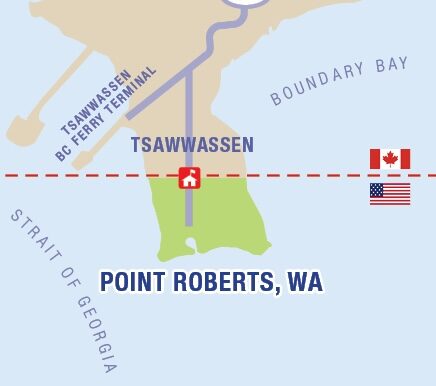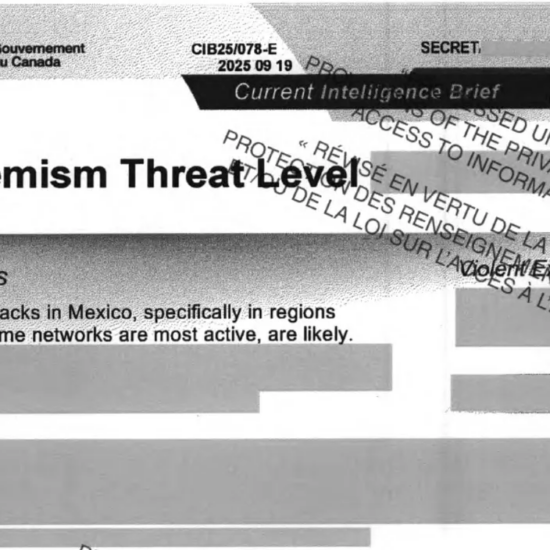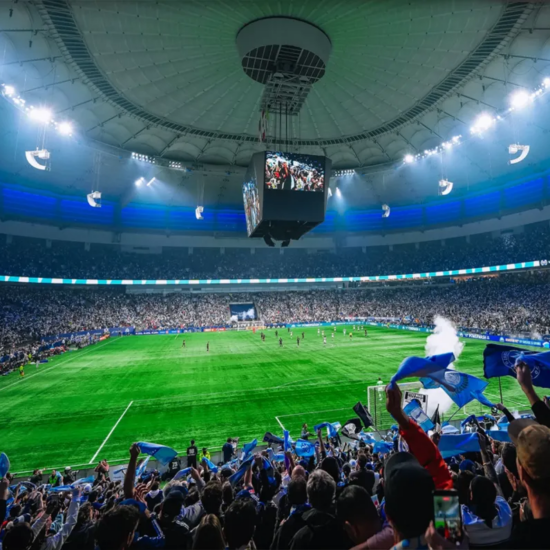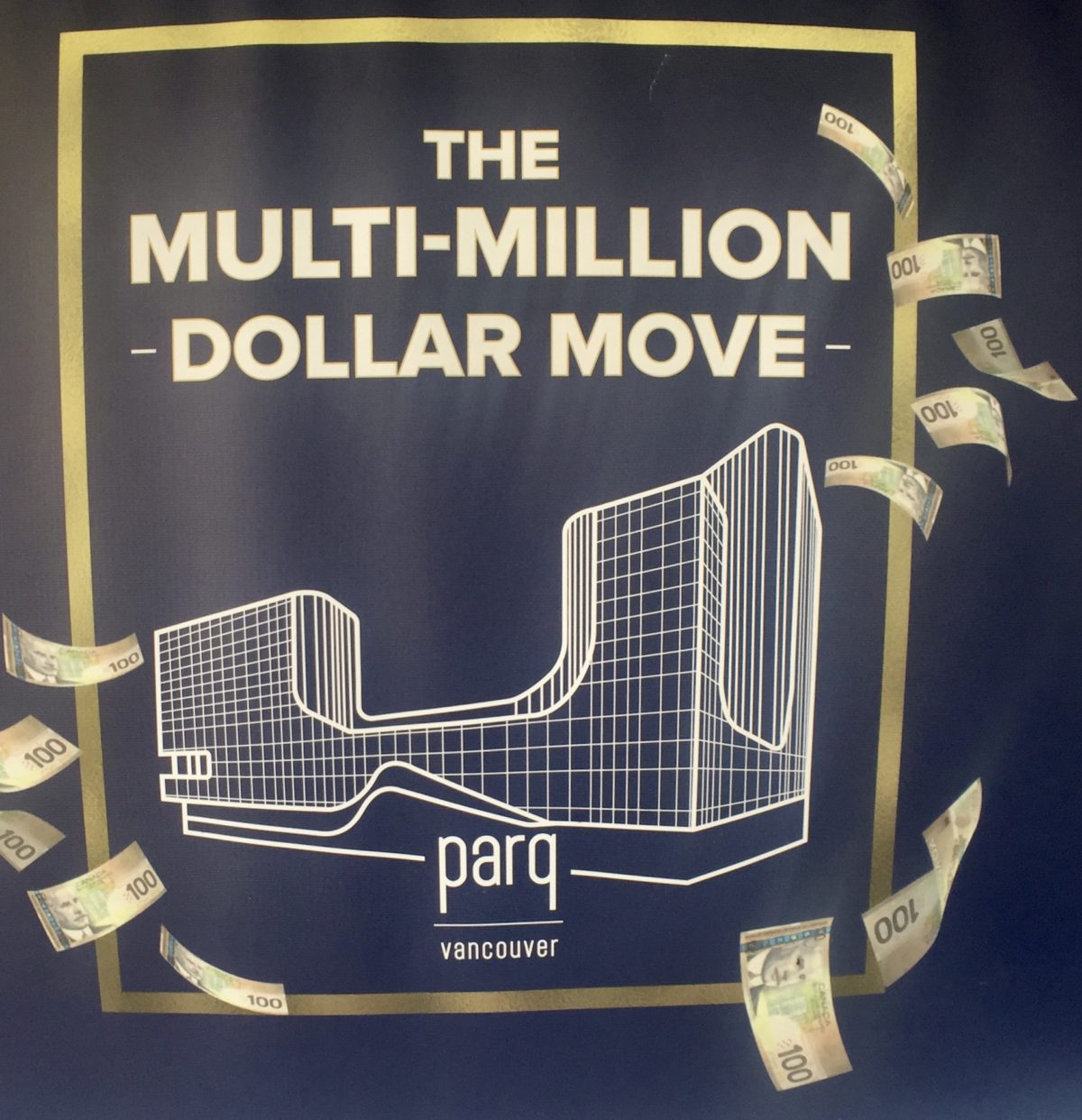
Bob Mackin
When Parq Casino opens Sept. 29 beside B.C. Place Stadium, operator Paragon Gaming says it will play within Vancouver city hall’s limit of 600 slot machines and 75 gambling tables.
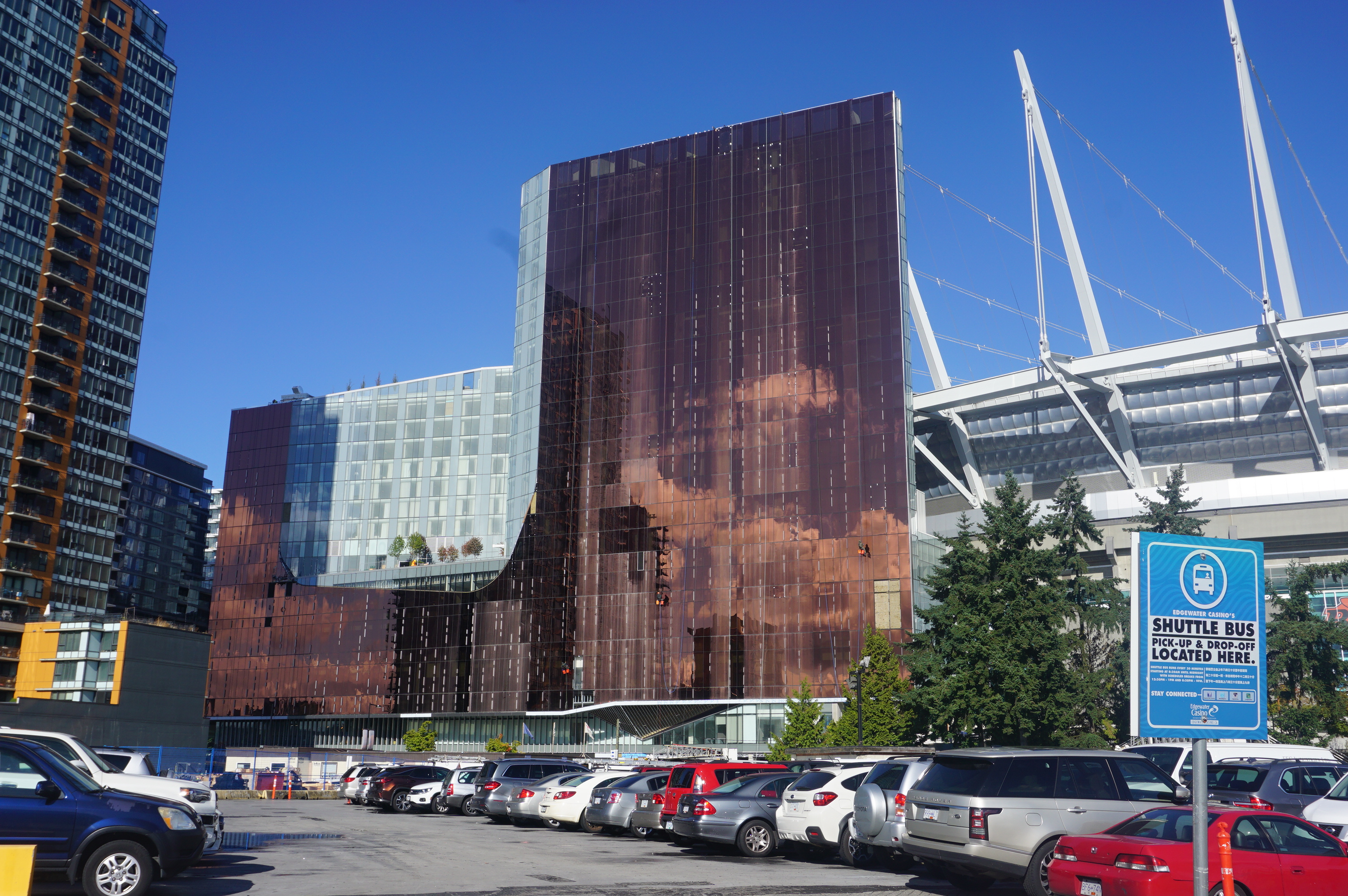
Copper facade of Paragon’s Parq casino and hotel complex in Vancouver (Mackin)
But some of those tables will accommodate two or three times more gamblers than others, and they will be staffed by more than one dealer. All thanks to a quiet change under the previous BC Liberal government that enabled expansion by default.
B.C. Lottery Corporation already let Paragon redefine table shapes and sizes within its licence at the Sept. 29-closing Edgewater Casino, which has an 18-seat, Classic EZ Baccarat table and a 16-seat, Classic American Roulette table.
Six years ago, Paragon wanted more. Much more: 1,500 slots and 150 tables, to be exact. The Vision Vancouver-majority city council rejected the expansion unanimously, but allowed relocation of Paragon’s existing 600-slot, 75-table licence.
“Classic tables require one dealer supervisor and two dealers who work together to conduct a single game,” said BCLC spokesman Doug Cheng. “Edgewater Casino is in compliance with BCLC’s policies and the City of Vancouver’s restrictions on table games.”
Vancouver city hall spokesman Jag Sandhu said city staff are “reviewing this matter, to determine if the suggested ‘double-sized tables’ are permitted at the current and future casino.”
“The review and approval of the development permit does not refer to the size and configuration of the individual tables,” Sandhu said in a prepared statement sent to theBreaker. “Further, the approval of the development permit is accompanied by a letter from [BCLC] acknowledging the request and approval for the number and table game mix. It also does not specifically address the size or number of participants at the gaming table.”
During a visit to Edgewater, theBreaker noticed most of the gambling tables accommodated between six and eight players. The supersized baccarat table, near the Li Room on the second floor of the former Expo 86 B.C. Pavilion, was populated with elderly gamblers.
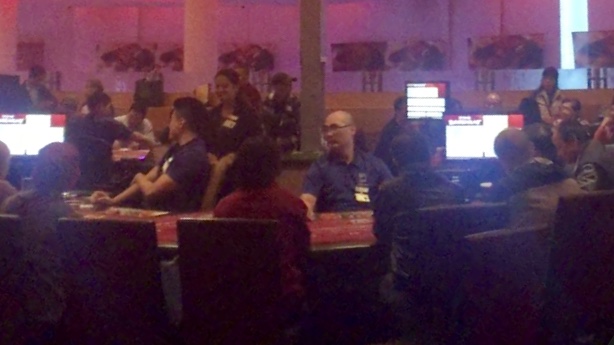
Supersized baccarat table in Edgewater with two dealers.
Ontario Lottery and Gaming Corporation sets limits with greater precision. Documents for bidders to take over the Casino Thousand Islands in Kingston show that facility was capped at 600 slot machines and “300 table positions (approximately 50 live table games),” or six players per table. Washington State Gambling Commission’s limit is “nine players or areas for wagering” at any table in house-banked card games. Quebec states that the number of players at a blackjack table corresponds to the number of betting boxes on the layout; however, the cards are only dealt to a maximum of seven, seated players.
What happens in Vegas?
“The number of players on a table is dictated by the number of positions on the table layout,” said Nevada Gaming Control Board agent John Kariam “On blackjack, there are generally seven positions. However, some casinos may have layouts that allow only five players. On craps, there are generally 16 positions where a player may bet from.”
theBreaker wanted to interview Scott Menke, CEO of Las Vegas-headquartered Paragon, but was told that he is too busy preparing for the Sept. 29 transition from Edgewater to Parq. A representative for the company, who refused to be identified in print, said “both Parq Vancouver and Edgewater Casino work with BCLC as a service provider to ensure all their policies are being followed and continue to be compliant with all regulatory requirements.”
NDP Attorney General David Eby, who is responsible for B.C.’s gambling industry, told theBreaker that the terms of the licence set the number of tables, not the number of seats.
“It’s an interesting issue that has been raised here, I’m going to follow-up with staff,” Eby said.
Chuck Keeling, vice-president of Paragon competitor Great Canadian Gaming, declined to comment.
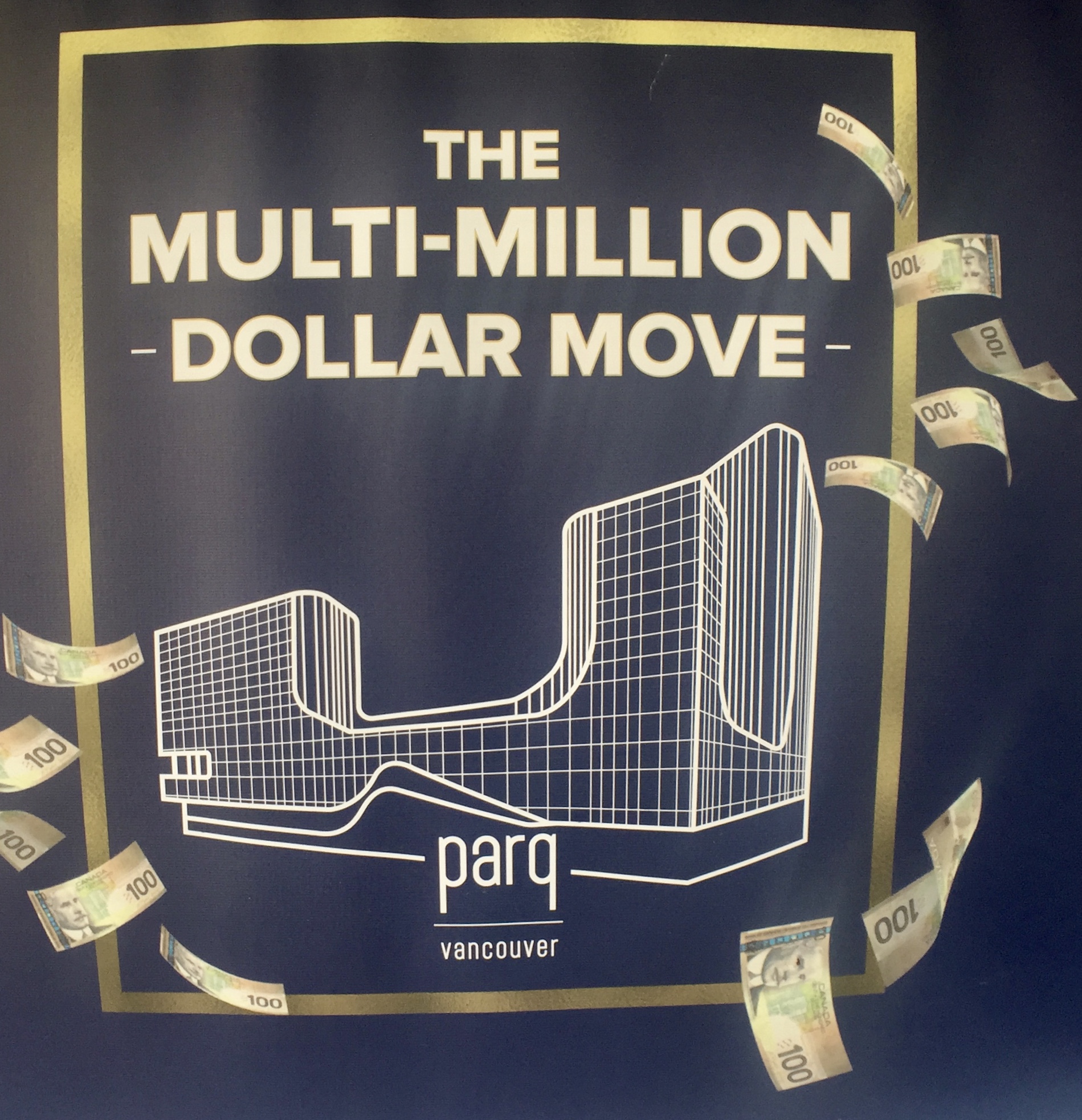
Ad outside Edgewater (Mackin)
The subtle expansion is not the only ace that governments under Gordon Campbell and Christy Clark dealt the operator of downtown Vancouver’s only casino.
Parq-ing underground
BCLC pumped $32.5 million in subsidies into the B.C. Place casino’s parkade. The funds came from a facilities development commission scheme created under the NDP in 1997 and amended in 2006 under the BC Liberals to stimulate casino renovation and expansion. Campbell led the BC Liberals to power in 2001 on a platform that included a broken promise to not expand gambling.
In 2012, BCLC CEO Michael Graydon asked for the BC Liberal government’s approval to temporarily increase the additional accelerated development commission from 3% to 5% and accelerated facility development commission from 2% to 4% through March 31, 2017. BCLC normally pays a 25% commission on slot machine “net win” (another way of saying the money lost by gamblers) and 40% on table game net win.
In Graydon’s Sept. 12, 2012 letter to GPEB Assistant Deputy Minister Douglas Scott, he said the $73.4 million, 1,200-stall parkade beside B.C. Place needed BCLC help. City hall required it be built underground, which “has significantly increased the project construction costs impacting the economics of the project when compared to similar facilities developed in suburban areas.”
Graydon’s April 11, 2013 letter to BC Liberal gambling minister Rich Coleman said Edgewater forecast a negative impact of $4.6 million each year through the end of March 2015, while the new location was under construction.
The BC Liberal goverment rubber-stamped the commission increase before the 2013 provincial election, allowing Paragon to keep $13 million more of its winnings to pay for the parkade, which began construction in 2014. The move was not announced publicly by the government.
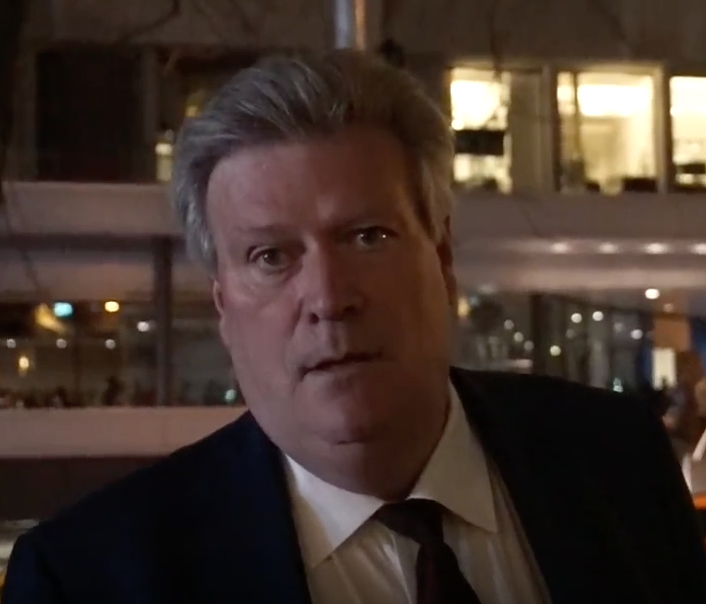
Coleman (Mackin)
“BCLC did not pay Parq commissions for the underground parkade until it was satisfied certain conditions were met,” Cheng said. “Payments began in December 2015. Up to March 31, 2017, BCLC had approved $41.9 million in parkade expenditures as eligible for commissions. Up to March 31, 2017, Parq earned $32.5 million in facility development commissions for parkade expenditures. BCLC is still determining the final amount of the parkade cost that is eligible for facility development commissions.”
In another pre-election move in 2013, the BC Liberals cut Paragon’s $6 million-a-year lease in half to $3 million, after city council’s 2011 restriction changed the casino’s business plan.
Graydon quit BCLC in late January 2014 to become president of PV Hospitality, the Paragon company building the casino. A Finance Ministry internal investigation later found Graydon in conflict of interest for negotiating his switch to the BCLC casino partner while still head of the Crown corporation.
In December 2013, Graydon spearheaded the increase in table betting limits at B.C. casinos, including Paragon’s, from $90,000 to $100,000. That came, coincidentally, after Paragon co-founders Menke and Diana Bennett each donated $5,078 to the BC Liberals in November 2013.
After the conflict of interest rulling, Graydon was forced to repay $55,000 of his salary, but kept $30,000 in vacation pay. In January 2016, Graydon departed from PV Hospitality. Neither PV nor Graydon revealed why.
The company had said in 2011 that the project, which includes two Marriott hotels, would cost $450 million. Paragon says it is now worth $600 million. Parq was supposed to open in early 2017, but will finally open in time for China’s National Day Golden Week, when an influx of visitors is expected.
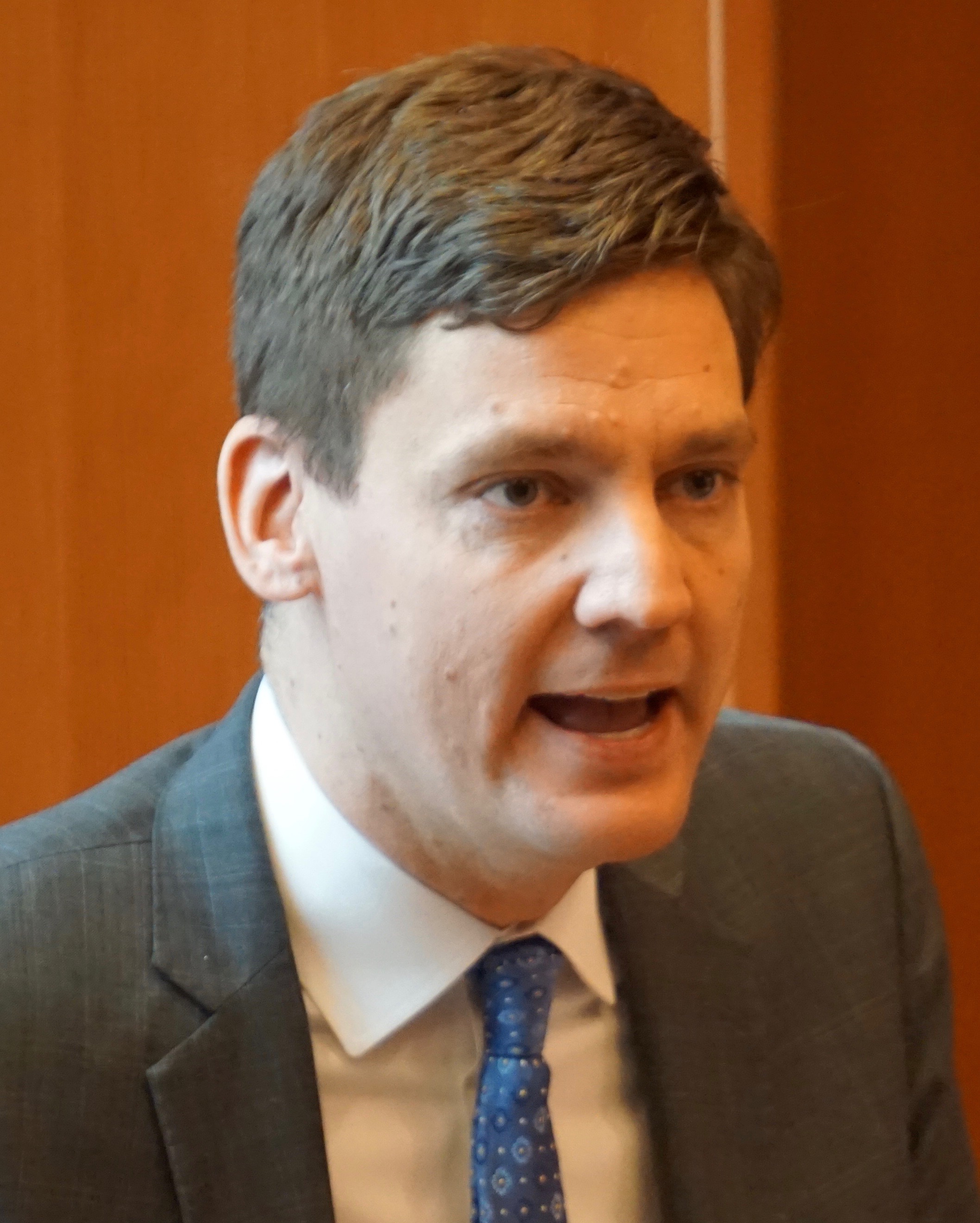
A-G Eby (Mackin)
The BC Liberal government picked Paragon in late June 2009 to develop the property. A director of Paragon’s Canadian subsidiary, then-ICBC chair Richard Turner, donated $50,000 to the BC Liberals through his TitanStar Holdings company the month before the decision. Turner joined the board of the Paragon subsidiary that bought Edgewater out of bankruptcy in mid-2006, six months after he quit as BCLC chair.
Eby said he became concerned during his time in opposition about the preferential treatment given Paragon and the revolving door between BCLC and Paragon. Since becoming Attorney General two months ago, he has ordered BCLC to reform the facility development commission system.
“One of the things I made clear to staff on taking on this role is that we’re going to make sure that gaming in B.C. is responsibly done, is fairly administered, and is beyond reproach,” Eby said. “That is the message that I’ve sent out to staff here. A lot of that was informed by watching this file evolve with Paragon.”








